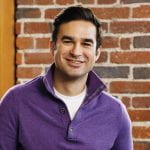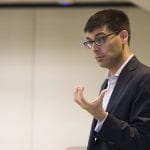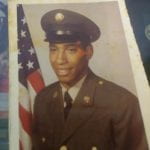
On February 10, my social justice group – nuclear weapons, had an interview with Derek Johnson who is the head of Global Zero which is an organization focused on eliminating all nuclear weapons. They plan to make an agreement which eliminates all nuclear weapons by the year 2045 or before.
His work really interested me and made me wonder how they plan to eliminate all weapons by 2045. We first asked him about the background of his company and his journey which started at Global Zero in 2010. Global Zero used to be focused on rallying global leaders and other people so the threat of nuclear weapons is widely known across the world. Global Zero thinks it’s logical to eliminate all nuclear weapons. When he took over, he started a new approach to rally people who don’t have as much power as global leaders because it’s their job to make people think about this topic and realize the damage it can do so that they can take actions toward the disarmament of nuclear weapons. The feedback he received was mostly people telling him that his goal was never going to be achieved by eliminating all nukes but his response was the fact that over the course of the last 30 years, the amount of nuclear weapons 30 years ago(70,000) has reduced by 80% to roughly 13,000.
Then we asked him about how he planned for all 9 countries with nukes to get rid of them. He told us that it was a 4 step process. Russia and the U.S. possess around 90% of the world’s nuclear weapons(around 5,000 each). His theory is that if you can get the U.S. and Russia to keep working to reduce the amount of nuclear weapons, countries will also eliminate their weapons but this won’t happen if Russia and the U.S. only get rid of a few hundred weapons, the other countries won’t do anything because the 2 countries with the most nukes have practically done nothing eliminating only a few hundred.
Global Zero’s plan is to eliminate all nuclear weapons by 2045 so we asked him about a potential nuclear war happening before 2045. He said that every day, there is a risk, that isn’t very high, but there’s still a risk. But then he talked about current threats like in Ukraine and how the chances will keep increasing if countries are careless. Another thing that we thought would be a problem is the loss of jobs because if there aren’t anymore nuclear weapons, wouldn’t the people working with them lose their jobs? He responded to this and he’s prepared for the people who will lose jobs. He said that there aren’t many people working to build nukes anyways but for the people that are, their work will be useful when there aren’t any nuclear bombs such as making sure that no nuclear bombs are being made after all are eliminated. Then we asked him about non-nuclear countries obtaining nuclear weapons. He said that it is a concerning matter that he should care about but there isn’t much he can do. There are many countries who can build a nuclear bomb but decide not to but can pull out of treaties to make nuclear bombs so he plans to get rid of nukes before they get in the wrong hands.
He also told us about how the public has influenced government decisions of nuclear weapons. In 2005 protesters who demanded change and the U.S. president at the time, Ronald Reagan, and Russian president, Vladimir Ivashkowhich were notified and this led 30 years of progress.
This interview, I learned a lot about how the public can protest and make a change in eliminating nuclear weapons and his work was really interesting. He has planned for multiple inconveniences in Global Zero’s plan to eliminate all nuclear weapons and has a plan to make all countries get rid of their nuclear arsenal. We learned a lot about Global Zero and how we can make a change.









